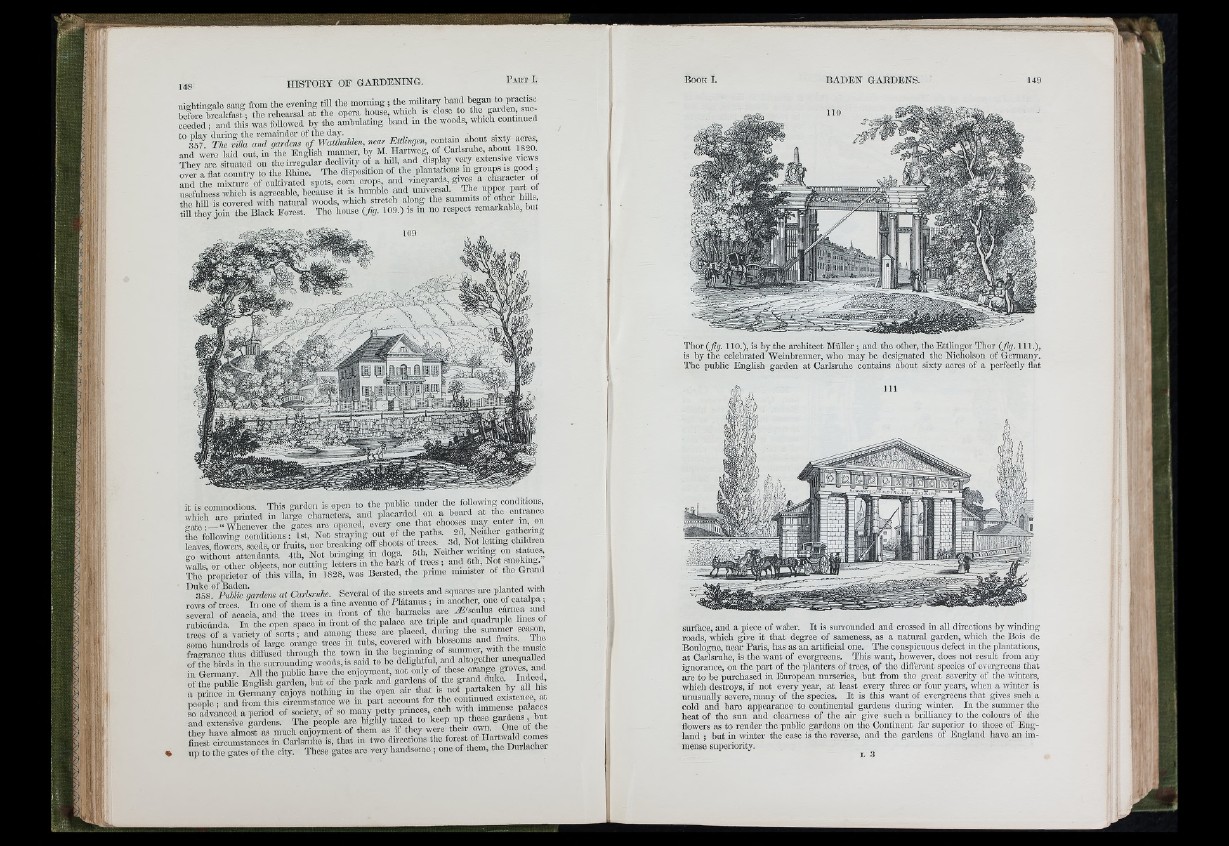
tl
f -
k 11 )
))
M
ni<vhtin<"ile sanir from the CTening till the morning ; the military band began to practise
ta foL b reA & L t t a r c t a L a l at the opera honro, which is close to the garden, snc-
cccded ; and thi! was followed by the ambulating hand in the woods, which continued
" E m ,g e n , c ^ ta in a ta ta a ^ ,
nnd Avoi-e laid out in the English manner, by M. Ilai-tweg, of Carlsnihe, about 1820.
They ™c i i i a t c d ’on the iiTCgular declivity of a hill, and display very extensive atcws
OYc / a flat couiitiy to the Rhine. The disposition of the plantations J" ’
and the mixture of cultivated spots, com crops and vincyar-ds gn cs a charaetm o
usefulness which is agreeable, because it is Immhlc and universal. The “ PPC^ part ot
ho ill is covered wfth natm-al woods, whieh stretch along tho summits f 0* « h
iU hey join tho Black Forest. The house (.fig. 109.) is m no respect remarkable, but
BADEN GARDENS.
it is commodious. This garden is open to the public uiidei the “ S
which are printed in large eharactors, and placarded on a boaid at ‘1 ® ™
g a te : — “Whenever the gates arc opened, every one ‘^ t ®hooses may caitor ^
the following conditions: 1st, Not straying out of the paths. ^ h ^
leaves, flowers, seeds, or fi-uits, nor breaking ofl shoots of tr e c ^ -fu ’A ^ l w oli statues
go without attendants. 4th, Not bringing m dogs Mh, Neither wutnig on s tM ^
walls, or other objects, nor cutting letters in the hmk of trees -, “" ‘Y ^ / L l L G r a n d
The proprietor of this Glia, in 1828, was Bersted, the prime minister of tho Giand
Ui Carlsruhe. Several of the streets and squares “>-®
rows of trees. In one of them is a fine avenue of Platanus ; in ™®
several of acacia, and the trees in fi-ont of the bai-racks are ?” os of
rubicmida. In the open space in front of the palace are tiy le and quadnqilc lines of
trees of a variety of sorts ; and among these arc placed during tho summOT scasOT
some hundreds of large orange trees in tubs, covered with b o,ssoms am ^ J o
fi-agi-.ance thus diffused through the toivn m the beginning of f®?;,
of Sie birds in the sun-ouiidiiig woods, is .said to be ^ b g h J l , a j J o g J e r uneqtm
in Germany. All the public have the enjoyment not only f J®®®,®‘ J | ® f J ^ S d
o fth e public English gai-den, but of the park and gardem of the f
'I uritice in Germany cnioys notliing in the open air that is not partaken b j all Ins
people; and fi-om this cfrcmnstanoe we in part account for the “L a c c i
L advanced a period of society, of so many petty princes, each L L L o u s b S
and extensive gai-dons. The people are luglily taxed to keep up t h ^ S f t® J ' ^ “ t
they have almost as much enjoyment of them as if they were then- ®™- On® J J o
finest circumstances in Carlsmlio is, that in two directions the
up to the gates of tho city. These gates arc very handsome ; one of them, tlio Dmlachcr
Tlior(/<7. 110.), is b y th e ai'chitcct Müller; and the other, the Ettlingcr Thor (fig. 111.),
is by tlie celebrated Wcinbrcnncr, who may be designated the Nicholson of Gennany.
The public English garden at Carlsmhc contains about sixty acres of a perfectly fiat
surface, and a piece of wa,lcr. I t is surrounded and crossed in all directions by winding
roads, which give it that degree of sameness, as a natural gai'den, which tlie Bois de
Boulogne, near Paris, has as an artificial one. The conspicuous defect in the plantations,
at Carlsruhe, is the want of evergreens. This want, however, does not result from any
ignorance, on the part of the planters of trees, of the different species of ei'crgreens that
arc to be purchased in European nurseries, but from the groat severity of the winters,
which destroys, if not every year, at least every thi'ce or four yeai's, when a winter is
unusually severe, many of the species. I t is this want of evergreens that gives such a
cold and bare appearance to continental gardens during winter. In the summer the
heat of tho sun and clearness of the air give such a brilliancy to the colom-s of the
flowers as to render the public gai'dens on the Continent far superior to those of En g land
; but in winter the case is the rcvci'sc, and the gai'dens of England have au immense
superiority.